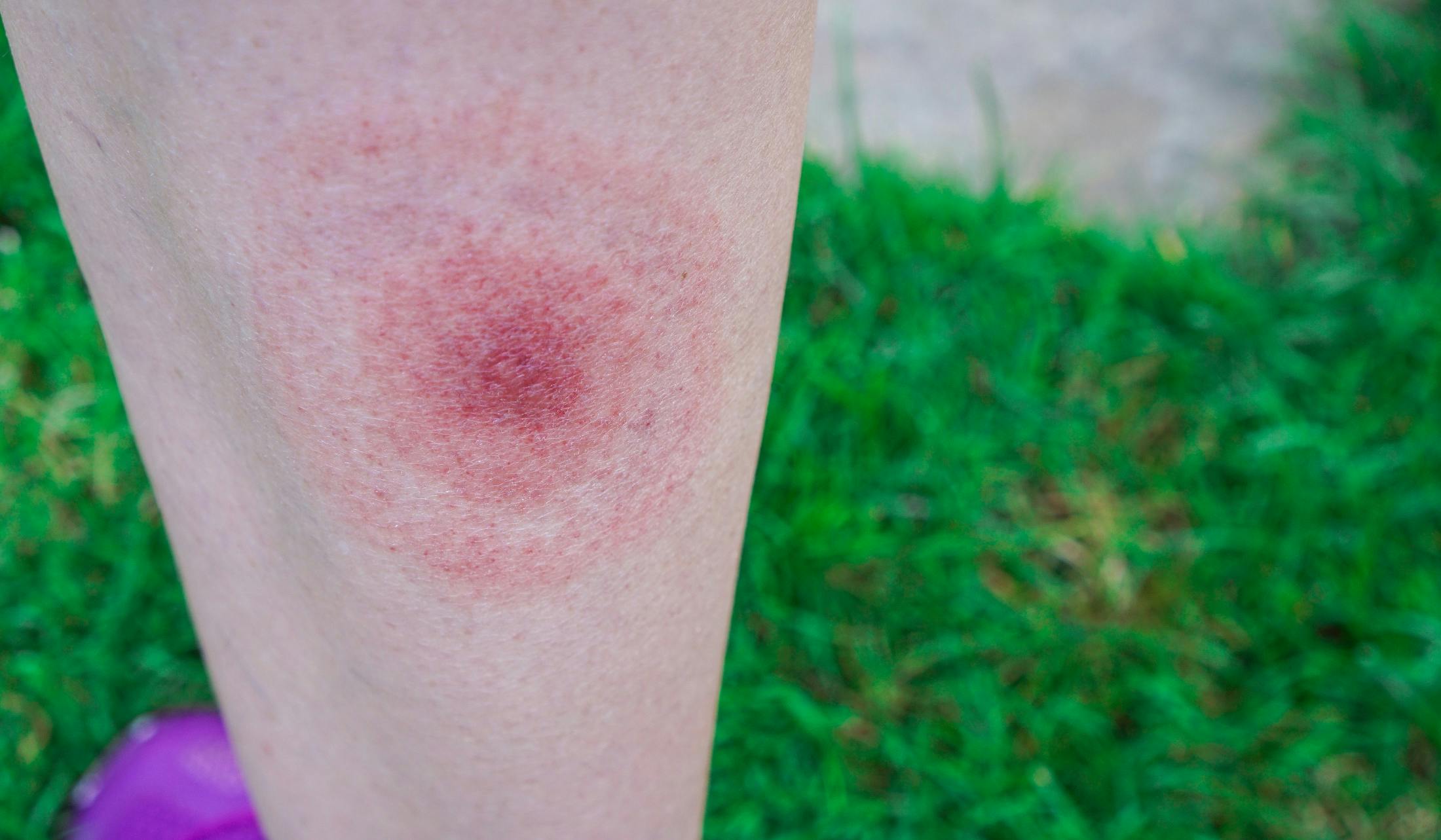What Does Lyme Disease Rash Look Like?
The classic Lyme disease rash presents with a bulls-eye pattern that spreads up to 12 inches from the site of the bite. But, relatively few Lyme disease rashes actually mimic this dartboard design and are therefore more easily missed.

According to John Aucott, MD, associate professor of medicine at Johns Hopkins University School of Medicine in Baltimore and director of the Johns Hopkins Lyme Disease Research Center, “classic target pattern represents just 20% of Lyme-related skin lesions in North America.”
Types of Lyme Disease Rash
According to the Bay Area Lyme Foundation, the rash associated Lyme disease can present differently based on a variety of factors. These include, but are not limited to:
- How long you’ve been infected.
- The spot of the infection.
- Your skin tone.
This makes diagnosing by the rash alone more difficult, especially if the patient’s rash doesn’t present with a telltale target like formation. Alternative formations include:
- Blistering Lesions
- Uniformly Red Lesions
- Blue-Red Lesions
- Disseminated Lesions
Lyme Disease Symptoms
The good news is, a rash isn’t the only way to diagnose Lyme disease. It can cause a myriad of symptoms. The bad news is, those symptoms are not pleasant. According to the Center for Disease Control (CDC), initially these symptoms can include:
- Fever
- Chills
- Headache
- Fatigue
- Muscle and joint pain
- Swollen lymph nodes

If caught early, Lyme disease can often be cleared up with medication.
What Happens if Lyme Disease is Misdiagnosed
If left untreated, the Lyme disease infection can spread to joints, the heart, and the nervous system. This is considered chronic Lyme disease.
One of the major problems of chronic Lyme disease is that the symptoms can mimic other illnesses. When a misdiagnosis takes place and an incorrect treatment is introduced, the body is further ravaged by medicines and therapies that don’t address the actual issue at hand.

Chronic Lyme disease symptoms can range from uncomfortable to debilitating.
What Chronic Illnesses Are Often Mistaken for Lyme Disease?
In 2019, the Today Show took a close look at the devastating life-long effects a 34-year-old Stephanie Tait suffered due to chronic Lyme disease. Among her symptoms were chronic fatigue, arthritis, memory issues, and joint pain. These symptoms are similar to the following chronic illnesses, which is why chronic Lyme disease is often misdiagnosed:
- Juvenile idiopathic arthritis
- Fibromyalgia
- Chronic fatigue syndrome
- Multiple sclerosis
- Arthritis
Natural Treatments for Chronic Lyme Disease
It may be that your rash has long since dissipated by the time your chronic Lyme disease is diagnosed. In large part, this is because Lyme disease is so frequently overlooked, especially on the West Coast in Washington, Oregon, and California.
As with Stephanie Tait, getting a diagnosis often requires “insisting upon tests that doctors said were unnecessary.”
One of the most important steps to naturally treat chronic Lyme disease is actually being diagnoses. This means working with a doctor who is committed to looking at not just your symptoms, but all aspects of your life. Your naturopathic doctor should consider:
- Health history
- Daily activities, past and present
- Past travel adventures
- Hormone levels
- Potential vitamin deficiencies
All of these factors and more can play a role in your overall health.

Don't let something as simple as a walk through the park endanger you or your family.
How Common is Lyme Disease in California?
Lyme disease on the East Coast is substantially more common than in California. This is because there are fewer black-legged ticks in California. Unfortunately, a 2018 article by Nina Bai published by the University of California San Francisco reports that cases have been increasing.
Bai attributes this to several potential reasons, including travel and climate change. Namely, that as the climate has changed and the habitat for the black-legged tick has expanded. Bai wrote, “the Ixodes or black-legged tick, has expanded westward from the northeast United States as well as southward year after year.”
In short, Lyme disease is more common now because there are more black-legged ticks.
Where is Lyme Disease Most Common in California?
According to the University of California Agricultural & Natural Resources, the highest incidences of Lyme disease have occurred in the northwestern counties of Trinity, Humboldt, and Mendocino. Sonoma Valley is also considered a hotbed for Lyme disease.
In Anne Ward Ernst’s article “Tick Season chomping at the bit,” published February 6, 2020, in the Sonoma Index-Tribune,Sonoma Index-Tribune, took a close look at Lyme disease in Sonoma Valley. She explained that the high occurrence of ticks is due to:
Sonoma Valley has thousands of acres of open space where the little buggers live, and given that the lifecycle of some ticks may be up to three years, ample time for one to latch onto a bare human leg or a dog shoulder passing by.

Can Lyme Disease be Transmitted Person-to-Person?
Lyme disease is caused by Borrelia burgdorferi, a bacteria that’s spread through the bite of an infected tick. Ticks can attach to any part of the body, but are often located in hard-to-see areas, like the groin, armpit, and scalp.
According to the CDC, there is no evidence that Lyme disease can be transmitted person-to-person. Touching, kissing or sexual intercourse cannot ‘pass’ the disease.
Do You Have Chronic Lyme Disease?
If you suffer from undiagnosed fatigue, restless sleep, pain and aching in your joints or muscles, swelling in your joints and/or memory problems, you could be battling an undiagnosed case of chronic Lyme disease.
Schedule a consultation with one of our naturopathic doctors to being diagnosing any chronic illness that could be keeping you from the life you want to live.




